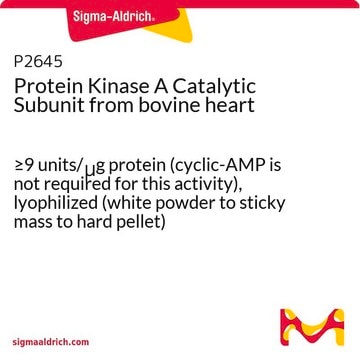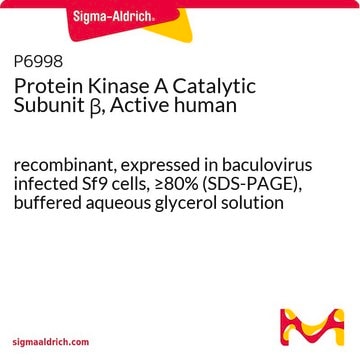All Photos(1)
About This Item
Empirical Formula (Hill Notation):
C39H74N20O12
Molecular Weight:
1015.13
UNSPSC Code:
12352204
NACRES:
NA.32
Recommended Products
product name
PKA Substrate,
Assay
≥95% (HPLC)
form
lyophilized
composition
Peptide Content, ≥60%
storage condition
protect from light
storage temp.
−20°C
Amino Acid Sequence
Gly-Arg-Thr-Gly-Arg-Arg-Asn-Ser-Ile-NH2
General description
cAMP-dependent protein kinase (PKA) Substrate (GRTGRRNSI-NH2) is a nine amino acid phosphorylatable substrate of cyclic adenosine monophosphate (cAMP)-dependent protein kinase.
Application
cAMP-dependent protein kinase (PKA) Substrate has been used as a peptide substrate for Plasmodium cyclic guanosine monophosphate (GMP)-dependent protein kinase in enzymatic assay and inhibition assay. It has also been used as a positive control in the in vitro protein kinase A (PKA) phosphorylation assay.
Storage Class Code
11 - Combustible Solids
WGK
WGK 3
Flash Point(F)
Not applicable
Flash Point(C)
Not applicable
Certificates of Analysis (COA)
Search for Certificates of Analysis (COA) by entering the products Lot/Batch Number. Lot and Batch Numbers can be found on a product’s label following the words ‘Lot’ or ‘Batch’.
Already Own This Product?
Find documentation for the products that you have recently purchased in the Document Library.
Michael J Moore et al.
The Journal of biological chemistry, 278(12), 10613-10618 (2002-12-25)
For optimal activity the catalytic subunit of cAMP-dependent protein kinase requires a phosphate on Thr-197. This phosphate anchors the activation loop in the proper conformation and contributes to catalytic efficiency by enhancing the phosphoryl transfer rate and increasing the affinity
Jacqueline B Pierce et al.
Eukaryotic cell, 13(2), 209-230 (2013-12-04)
The two main signal transduction mechanisms that allow eukaryotes to sense and respond to changes in glucose availability in the environment are the cyclic AMP (cAMP)/protein kinase A (PKA) and AMP-activated protein kinase (AMPK)/Snf1 kinase-dependent pathways. Previous studies have shown
Q Ni et al.
Protein science : a publication of the Protein Society, 9(9), 1818-1827 (2000-10-25)
The binding of the methylanthraniloyl derivatives of ATP (mant-ATP), ADP (mant-ADP), 2'deoxyATP (mant-2'deoxyATP), and 3'deoxyATP (mant-3'deoxyATP) to the catalytic subunit of protein kinase A was studied to gain insights into the mechanism of nucleotide binding. The binding of the mant
Maria Penzo et al.
Scientific reports, 9(1), 7005-7005 (2019-05-09)
Antimalarial drug resistance compels the quest for new compounds that target alternative pathways to current drugs. The Plasmodium cyclic GMP-dependent protein kinase (PKG) has essential functions in all of the major life cycle developmental stages. An imidazopyridine PKG inhibitor scaffold
Manu Vanaerschot et al.
Cell chemical biology, 27(7), 806-816 (2020-05-04)
The search for antimalarial chemotypes with modes of action unrelated to existing drugs has intensified with the recent failure of first-line therapies across Southeast Asia. Here, we show that the trisubstituted imidazole MMV030084 potently inhibits hepatocyte invasion by Plasmodium sporozoites
Our team of scientists has experience in all areas of research including Life Science, Material Science, Chemical Synthesis, Chromatography, Analytical and many others.
Contact Technical Service




